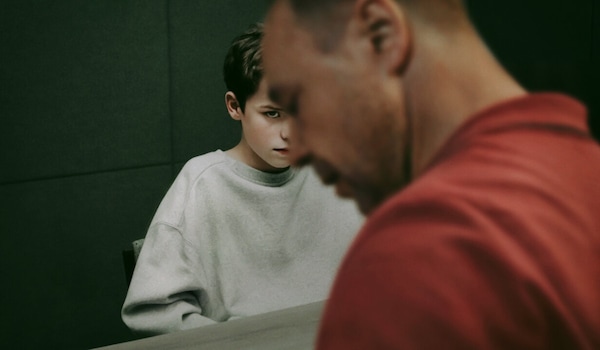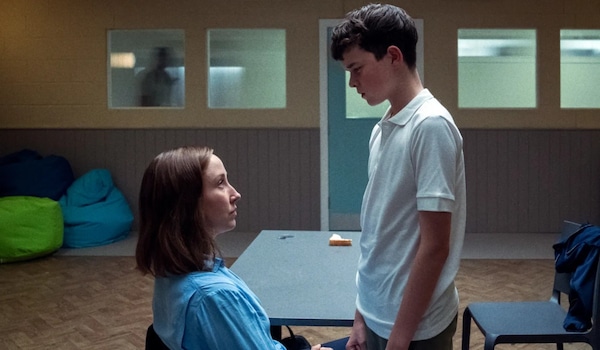Adolescence Series Review: A masterclass, one-shot examination on masculinity, social media, parenting, and society
Adolescence Series Review: With poignant performances and a thought-provoking narrative, it's a must-watch that challenges societal norms and parental responsibilities

Last Updated: 05.34 PM, Mar 18, 2025
Adolescence Series Plot
Jamie Miller, a 13-year-old is arrested from his home by the police, on the grounds of being accused of murdering his schoolmate Katie by stabbing her. Even as he refuses doing the crime, what follows is an intense four-episode single-shot drama, in the aftermath of the arrest and trial.
Also read: From Black Mirror to Stranger Things - Netflix series worth binge-watching again and again
Adolescence Series Review
In Adolescence, each of the episodes is dedicated and painstakingly shot within a certain milieu and circumstance. The second episode has DI Luke Bascombe and DS Misha Frank visit Jamie and Katie’s school to probe the murder and the events that could have possibly led to it. Misha, who is aiding Luke in the investigation, makes some poignant points that reality cannot ignore. That what all children really need is “one thing that makes them feel okay about themselves”. She further goes on to make a point so clear and cut, when she points out how it is always the perpetrator who gets the “front line”, that everyone would remember Jamie and none Katie, that they are following Jamie’s brain. Luke’s comeback is that all they are doing is for Katie, and their responsibility is to understand why, to which Misha says they never will. This conversation might seem very insignificant and irrelevant, for what the rest we see is everything that surrounds Jamie and if he did(not) commit the crime. But when the perpetrator is a 13-year-old boy who is grappling to understand how society sees him, and if the word “ugly” can trigger his insecurities to the fore, Adolescence is a brilliant probe drama that encapsulates society, parenting, the idea of masculinity and social imagery in the cleverly stitched crime drama.
Each episode in Adolescence is dedicated to an hour-long sequence of what happens at each stage of the story. The first one is Jamie getting arrested by Luke, and taken to the investigating venue, while we are shown the elaborate process of what is the standard procedure to hold a minor at detention centre. The second one has Luke and Misha probing the school, which displays an array of emotions by Katie’s friend Jade; a Black girl who is devastated by the demise, and who evidently is at the receiving end of discrimination, teacher Mrs Fenumore who is more than willing to help and assist the cops, and getting hold of Ryan, Jamie’s accomplice and whose knife was used to stab Katie.
The third episode, which is the brilliant of the lot, is set within the detention centre, where Jamie has this conversation with psychologist Briony Ariston and the events that led to the crime scene are unravelled. The brilliant staging, and the angles that pan across the faces of Jamie and Briony, bring the gender and age dynamics to the frontline. There is a vulnerability from Jamie’s side as he opens up to an older woman, while the latter is trying to unearth the deep-rooted sickness of masculinity among young boys. The past is brought, and not for once we are cut short to what has happened. Instead, the conversational piece unpacks what transpired in the events. It is at the time of Adolescence, that the deep-rooted infectious nature of cyberbullying, incel ideology, and radicalism are explored to the minute precision. Until when we could believe that probably Jamie could be innocent, Adolescence makes a brutal case of being in the era of influence, and social media can be just more than a mirage. Even as the series does not scream out loud to being about Gen Z, there are brilliantly planted cues within the social media arc of the series, that educate the symbolism and multiple meanings a concept can carry across generations.
Adolescence ends with the fourth episode, which nearly takes place about a year into the trial, and the family of Miller’s and their current status. While it is for you to watch and find out of Jamie is indeed the killer or not, the series is not motivated to dwell on the point, either which way. It is there to talk about the toxic subculture, somewhere lurking on the streets, and mostly on social media platforms. Like Misha says, the probe ends with Jamie’s family, while the victim’s is never to be shown. In this case, it makes more sense because the onus falls on those who take up parental responsibilities. It is more about what it takes to raise sons. In a world and society that often might consider daughters as burden, Adolescence makes you think right through. It says how much of a responsibility it is to parent a son, who could potentially grow up to be a targetter or, a scion of toxic culture and ideology that tends to be cut grassroot.

Adolescence is brilliant in its making. The single shots have a reason to exist, and the claustrophobia it sometimes can give you is rightfully needed. At other times, the camera acts like a silent spectator, as if you are one among the society members who can get as close as you want, and yet either be a facilitator or rescuer. The cast, with a brilliant, vulnerable and dynamic Owen Cooper as Jamie, Stephen Graham as the helpless father who has done his part in hit and miss of raising a son, and Erin Doherty as psychologist work so much close together to make the story become as haunting as it gets.
Following up with last year's Baby Reindeer limited series, Netflix does it once again with Adolescence.
Adolescence Series Verdict
Adolescence is a masterful storytelling, that blends craft and social commentary in the most nuanced way. The shooting technology and choices too are not for mere bragging purposes. The single shots can invite you over, and there is an inclusivity of making you one among the responsible. This series brilliantly explores the dark intersections of incel culture, social media, cyberbullying, masculinity, and parenting, shedding light on critical societal issues. It delves into the toxic environments that breed hatred and isolation, offering a sobering look at how digital platforms can multi-fold. A must-watch for anyone seeking to understand today's digital landscape.
Subscribe to our newsletter for top content, delivered fast.

